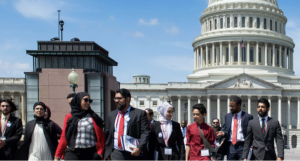(This is a supplement to the “Anti-Islam Legislation” section of CAIR’s “Legislating Fear: Islamophobia and its Impact in the United States 2011-2012” September 2014. Full citations are available in the report’s pdf.)
In 2013, 36 bills or amendments designed to vilify Islamic religious practices were introduced in the legislatures of 16 states.
Party of the Bill’s Original Sponsors
All 36 bills were originally sponsored solely by Republicans. Mainstream Republican leaders continued to support the bills. For example, Oklahoma’s Gov. Mary Fallin signed one such bill into law. Alabama’s Sen. J.T. Waggoner (R-Jefferson, Shelby) was Majority Leader for a similar bill. In Washington, Rep. Matt Shea (R-Spokane Valley) was Assistant Minority Floor Leader and Rep. Shelly Short (R-Addy) was the Minority Caucus Vice Chair. West Virginia’s Del. Linda Sumner (R-Raleigh) was assistant minority whip.
Number of Bills That Used Language of Islamophobe David Yerushalmi
David Yerushalmi often acts as the U.S. Islamophobia network’s legal counsel. Among his many anti-Islam writings is a piece for the American Spectator published April 27, 2006 in which he wrote, “Our greatest enemy today is Islam. The only Islam appearing in any formal way around the world is one that seeks a world Caliphate through murder, terror and fear.”
Thirty-three (92 percent) of the 2013 anti-Islam bills contained language that was extracted from American Laws for American Courts, template legislation written by Yerushalmi that forms the core of most of the anti-Islam legislation seen in the United States over the last few years.
Yerushalmi authored ALAC for the American Public Policy Alliance (APPA). While APPA has a professional-looking website, the address it lists in Washington, D.C., is a UPS store. On it’s website, APPA is very clear that it views Islamic religious principles, or Sharia, as one of two key threats to “constitutional protections and liberties,” alleging that these religious principles will be “imposed as a separate legal system in America for Muslims (and eventually for non-Muslims).”
Fate of Bills
Bills became law in Oklahoma and North Carolina. Those laws will be discussed in detail below.
In late May, the Alabama legislature approved an anti-Islam amendment to the state’s constitution. The measure will be on the ballot for voters to accept or reject in 2014. Rev. Richard Killmer, executive director of the National Religious Campaign Against Torture noted the “unspoken target of this amendment, Shariah or Islamic law.”
In October, Public Policy Polling reported, “26% of Americans think that Muslims are covertly implementing Sharia Law in American court systems, while 55% don’t think so and another 19% aren’t sure. There’s a huge partisan breakdown on this one as well – 42% of Republicans fear Sharia Law making its way into America’s courts while just 12% of Democrats agree.”
Supporters of anti-Islam legislation have generally evolved their strategies to mask the intended vilification of Islam, generally no longer mentioning “Islam” or “Sharia” in a bill’s text. However, Mississippi’s HB 711 and HB 1333 both explicitly stated that “foreign law” includes “sharia law.”
Discussions surrounding the bills continue to reflect the prejudiced intent behind them. In Missouri, Senators heard testimony that a bill “would prevent Sharia Law from taking over Missouri.”
At a hearing for an anti-Islam bill in Texas, “Supporters lauded [State Senator John] Carona (R-District 16) for fighting the sinister effort of foreign nations, and specifically sharia law, to subvert American ideals and subjugate women.”
Similarly, Sen. Craig Estes (R-Wichita Falls) said, “The supporters of the bill want to stop oppressive — and I do say oppressive — systems like Sharia, but that would also pick up benign systems of Jews, Catholics and immigrants from countries without separation of church and state.”
In Florida, state Senator Alan Hays’ (R-District 11) bill “would ban Shariah, or Islamic law, and other foreign laws from Florida courts” according to reporter James Rosica. Rosica noted, “There are no reported cases in which a Florida court applied foreign law.”
Defending his bill, Hays compared it to a vaccination against a disease.
Bill supporters included the Tea Party Network, which issued an e-mail to its supporters asking them to push elected officials for to vote for passage.
According to a dataset compiled by CAIR researchers, anti-Islam bills were introduced in sixteen state legislatures in 2013: Alabama (2 bills), Arkansas, Florida (2 bills), Indiana (2 bills), Iowa, Kentucky, Mississippi (4 bills), Missouri (2 bills), North Carolina, Oklahoma (7 bills), South Carolina (2 bills), Texas (6 bills), Virginia, Washington, West Virginia, and Wyoming (2 bills).
Anti-Islam bill efforts in three states deserve expanded focus.
Missouri
Gov. Jay Nixon, a Democrat, vetoed the anti-Islam bill (SB 267) introduced by Senator Brian Nieves (R-Washington) and passed by the Republican-controlled legislature.
Nieves had previously acknowledged that there was no immediate threat to the state. In a statement announcing the veto, Gov. Nixon said: “This legislation seeks to solve a problem that does not exist, while creating the very real problem of jeopardizing Missouri’s families’ ability to adopt children from foreign countries.” An attempt to override the veto, scheduled on the symbolic date of September 11, failed.
Oklahoma
HB 1060, was introduced by state Rep. Sally Kern (R-Oklahoma City). In 2008, Kern expressed her view that Islam itself is a threat to America, saying, “Gays are an even bigger threat than terrorism or Islam, which I think is a big threat.”
In 2011, Kern was reprimanded by the Oklahoma House for disparaging women and ethnic minorities. As reported by The Oklahoman, “During a debate Wednesday night on the House of Representatives floor, Kern said minorities earn less than white people and women earn less than men because they don’t work as hard and have less initiative.”
Like many legislators using ALAC, Kern has argued that her bill does not single out Muslims or Islam. However, the bill’s anti-Muslim genesis is clear. As Kern (R-Oklahoma City) herself pointed out, “Because of the careful planning and thought behind ALAC’s wording, from a practical standpoint, it is effective in preventing the enforcement of any foreign law—including Shariah law—that would violate U.S. and state constitutional liberties or state public policy.”
The wording of HB 1060 is clearly lifted from American Laws for American Courts. She acknowledged that her 2011 bill was copied almost word-for-word from American Laws for American Courts. Further, reporting revealed that she consulted with the Center for Security Policy on her 2011 bill and “some of the momentum for her bill comes from the work of (ACT for America’s) Brigitte Gabriel.” When asked whether Americans should “resist Muslims who want to seek political office in this nation,” Gabriel said: “Absolutely. If a Muslim who has—who is —a practicing Muslim who believes the word of the Koran to be the word of Allah, who abides by Islam, who goes to mosque and prays every Friday, who prays five times a day—this practicing Muslim, who believes in the teachings of the Koran, cannot be a loyal citizen to the United States of America.”
Oklahoma State Senator Ralph Shortey (R-Oklahoma City) acknowledged that he was unaware of any judges applying foreign law in Oklahoma.
Republican Governor Mary Fallin signed the bill into law on April 22, 2013.
North Carolina
House Bill 522, originally sponsored by four Republicans, was framed as banning the “application of foreign law” in family law cases in state courts. While Republican Governor Pat McCrory declined to sign the bill, calling it “unnecessary,” he nevertheless allowed it to become law by taking no action on it.
Bill sponsor Rep. Chris Whitmire (R-Transylvania) was reported handing out materials discussing Sharia in support of his bill. During the bill’s consideration, State Senator Thom Goolsby (R-New Hanover) equated foreign law to Muslim contracts, citing a 2012 case in which the North Carolina Supreme Court was petitioned to rule on the “legitimacy of an Islamic marriage and divorce.”
Similarly, the bill’s Senate sponsor, E.S. “Buck” Newton (R-Wilson), “was clear during Friday’s session that the legislation targets Sharia law, a legal system based on the religious and moral tenants of Islam.”
Bill supporters again made no effort to hide the legislation’s actual target. For instance, Concerned Women for America (CWFA) told its supporters, “North Carolinians’ constitutional rights are now protected from foreign laws, including Sharia Law.”
(Note: CWFA has indulged in Islamophobic rhetoric on a number of occasions. An extract from a 2009 edition of CWA’s Family Voice magazine relates, “[W]e saw the theistic worldview of Islam come face-to-face with the Biblical worldview of Christianity. A worldview that teaches a doctrine of force and violent submission to an unpredictable god faced a worldview that teaches a doctrine centered on a holy and just God who brings us into relationship with Himself. In one sphere, you die to prove your faithfulness; in another, God’s Son dies on your behalf to share His faithfulness. Will you pray that all followers of Islam will come to know the One True God of the Bible through His Son Jesus Christ who came to die for us sinners and bring us in relationship with Himself?”)
In earlier messages urging its supporters to seek passage of the bill, CWFA told supporters, “We will protect the Judeo-Christian values upon which our nation was founded. Sharia Law goes beyond religious liberties; Sharia violates individual’s constitutional rights.”
After the bill became law, Rep. Whitmire sent out an e-mail in which he specifically thanked “Concerned Women for America; ACT for America; the Security Policy Council; and the American Public Policy Alliance” for their “expertise and outreach” in support of the bill.
For more on this subject, see Legislating Fear.






